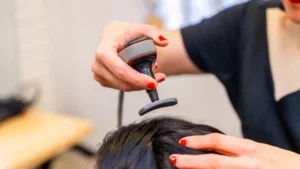Post-transplant shampoo is a critical part of your hair transplant aftercare routine. After a transplant, the scalp is highly sensitive, requiring gentle and careful treatment to promote healing and encourage healthy hair growth.
Choosing the wrong shampoo with harsh ingredients can lead to irritation, dryness, and, in some cases, poor transplant results.
My name is Emma Wright, your resident hair restoration specialist. Today we’ll be discussing Post-transplant shampoo. This guide will walk you through the ingredients that could hinder your healing and provide tips on selecting a shampoo that nurtures and protects your scalp during recovery.
To achieve the best outcomes, it’s essential to understand what ingredients to avoid in a post-transplant shampoo.
Why Choosing the Right Post-Transplant Shampoo Matters
Using a carefully selected post-transplant shampoo is crucial for ensuring your scalp recovers comfortably and that new hair grafts are protected.
With the sensitive state of the scalp after a transplant, using shampoos with unsuitable ingredients can delay healing and cause complications, such as one-sided hair loss or irritation.
To keep your scalp calm and aid in a smoother recovery, choosing a post-transplant shampoo free of specific harsh ingredients is essential.
-
Avoid Sulfates for a Gentle Clean
One of the first things to avoid in a post-transplant shampoo is sulfates, commonly listed as sodium lauryl sulfate (SLS) or sodium laureth sulfate (SLES). While effective in creating a rich lather, sulfates are harsh and strip the scalp of natural oils.
This dryness can lead to itching, redness, and delayed healing, making sulfates a poor choice for those recovering from a transplant.
Opt for sulfate-free shampoos that rely on gentler cleansers, such as cocamidopropyl betaine, which is derived from coconut oil. This alternative provides effective cleansing without over-drying, making it ideal for post-transplant care.
-
Skip Parabens to Avoid Irritation
Parabens are preservatives found in many shampoos to prevent bacterial growth. However, they can cause irritation, particularly on sensitive or healing skin, and disrupt the scalp’s natural balance. In a post-transplant shampoo, avoiding parabens reduces the risk of adverse reactions, allowing the scalp to heal comfortably.
Choose shampoos labeled “paraben-free,” which are often designed for sensitive skin. These formulas are suitable for those with delicate scalps and provide the necessary care without compromising your healing process.
-
Alcohols: Choose Hydrating Over Drying Types
Some shampoos contain alcohols, which help products dry quickly but can also strip moisture from the skin. Drying alcohols, such as isopropyl alcohol and benzyl alcohol, are particularly harmful in a post-transplant shampoo because they lead to scalp dehydration, which can trigger flaking and irritation.
Instead, seek out post-transplant shampoos that contain fatty alcohols like cetyl or stearyl alcohol, which have moisturizing properties. Hydrating ingredients like these help maintain the scalp’s moisture barrier, which is crucial for fostering new hair growth and preventing unnecessary irritation.
This approach is beneficial for those exploring various hair loss treatments or addressing other conditions that can impact scalp health.
-
Avoid Fragrances to Minimize Irritation
Artificial fragrances are commonly added to shampoos to create a pleasant scent but can lead to irritation on a sensitive, post-transplant scalp. Fragrances often contain synthetic compounds that can cause itching, redness, and inflammation, all of which hinder recovery.
Choosing a fragrance-free post-transplant shampoo is a safer choice. If a mild scent is desired, look for shampoos with natural essential oils, such as chamomile or lavender, as these are often gentler and less likely to cause an adverse reaction.
-
Silicones: Prevent Build-Up and Let Follicles Breathe
Silicones, including dimethicone, are often added to shampoos for smoothness and shine, but they create a layer that can block pores and trap oils. In a post-transplant shampoo, silicones may impede healing by preventing newly implanted follicles from breathing and growing properly.
Choosing a silicone-free post-transplant shampoo allows the scalp to heal without unnecessary build-up. This is particularly important for those planning long-term hairstyles, such as the best haircut after a hair transplant, as unrestricted follicles support a fuller, healthier look.
-
Avoid Petroleum-Based Ingredients to Encourage Faster Healing
Petroleum-based ingredients like mineral oil and petrolatum create a heavy barrier on the scalp, which can trap bacteria and delay natural healing. These ingredients may seem moisturizing but are generally too thick for a post-transplant shampoo.
Look for a post-transplant shampoo with natural emollients such as jojoba oil or argan oil. These ingredients nourish the scalp without creating an occlusive layer, allowing your scalp to breathe and heal effectively.
-
Say No to Harsh Detergents for Gentle Cleansing
Harsh detergents, such as ammonium lauryl sulfate and sodium chloride (salt), are often included in shampoos for their powerful cleansing abilities but can be too aggressive for a post-transplant scalp. These detergents can strip natural oils, leading to dryness and irritation.
Opt for shampoos with gentle surfactants, like decyl glucoside or coco-glucoside, which effectively cleanse without disrupting the scalp’s natural barrier. Such ingredients are ideal for those undergoing hair transplant for long hair or short, as they maintain the scalp’s health and support recovery.
-
Artificial Colors and Dyes: Extra Ingredients with No Benefit
Artificial colors and dyes add no functional benefit to a shampoo, especially in post-transplant care, and may cause allergic reactions. Synthetic dyes are often too harsh for healing skin and can lead to irritation.
Choose a post-transplant shampoo that’s clear or dye-free to minimize the risk of unnecessary irritation. Clear formulas generally contain fewer additives, allowing your scalp to focus solely on recovery and regrowth.
Tips for Selecting the Best Post-Transplant Shampoo
When choosing a post-transplant shampoo, consider these key factors to ensure it supports your healing:
- Gentle Formulas: Look for shampoos labeled as “mild” or “gentle,” which are suitable for sensitive skin.
- Moisturizing Ingredients: Ingredients like glycerin, aloe vera, and hyaluronic acid help retain moisture and support a balanced scalp.
- pH-Balanced Options: Shampoos with a pH of around 5.5 maintain the scalp’s natural barrier, reducing the risk of irritation.
- Natural Soothers: Chamomile, green tea, and aloe vera can offer calming effects, especially beneficial for sensitive or healing scalps.

Recommended Post-Transplant Shampoos
- Hypoallergenic Shampoos: These are often free from common irritants like sulfates, parabens, and fragrances, making them suitable for post-transplant use.
- Aloe Vera-Based Shampoos: Aloe vera provides natural soothing properties, ideal for calming and moisturizing the scalp.
- Green Tea Extract Shampoos: With anti-inflammatory benefits, green tea extract is helpful for maintaining a healthy scalp environment.
- Baby Shampoos: Mildly formulated for sensitive skin, baby shampoos like Johnson’s Baby Shampoo are free from harsh chemicals, making them ideal for the delicate, post-transplant scalp.
- Biotin-Enriched Shampoos: Shampoos containing biotin, such as Maple Holistics Biotin Shampoo, strengthen transplanted hair and promote growth. Free from sulfates and parabens, they’re gentle yet effective for supporting hair health.
- Ketoconazole Shampoos: Shampoos with ketoconazole, like Nizoral Anti-Dandruff Shampoo, have antifungal properties that prevent scalp infections and reduce inflammation, supporting a clean and healthy healing environment.
- Caffeine-Infused Shampoos: Caffeine-based options like Revita Hair Growth Stimulating Shampoo can enhance circulation to hair follicles, promoting growth while being gentle on the healing scalp.
- pH-Balanced Shampoos: These shampoos help maintain the natural pH of the scalp, supporting its protective barrier. Look for labels indicating “pH-balanced” to ensure a scalp-friendly product.
- Tea Tree Oil Shampoos: With antibacterial and anti-inflammatory properties, tea tree oil in shampoos, such as Dr. Organic Tea Tree Shampoo, provides a gentle cleanse while managing scalp health without over-drying.
- Free-from Chemical Shampoos: Formulas like Free & Clear Shampoo avoid sulfates, parabens, and artificial fragrances, offering a gentle cleanse ideal for a sensitive, post-transplant scalp.
Conclusion
A carefully chosen post-transplant shampoo is integral to a successful recovery. Avoiding sulfates, parabens, drying alcohols, fragrances, silicones, petroleum-based ingredients, harsh detergents, and artificial dyes can create a more comfortable healing environment.
Choosing the right post-transplant shampoo can prevent irritation, support healing, and lead to a healthier, fuller hair outcome. This mindful approach ensures that you’ll see the best results from your transplant and fosters the long-term health of your hair and scalp.














